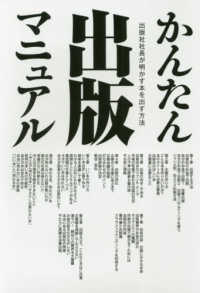- ホーム
- > 洋書
- > 英文書
- > Politics / International Relations
Full Description
From Reagan's regular invocation of America as "a city on a hill" to Obama's use of spiritual language in describing social policy, religious rhetoric is a regular part of how candidates communicate with voters. Although the Constitution explicitly forbids a religious test as a qualification to public office, many citizens base their decisions about candidates on their expressed religious beliefs and values. In Religious Rhetoric and American Politics, Christopher B. Chapp shows that Americans often make political choices because they identify with a "civil religion," not because they think of themselves as cultural warriors.. Chapp examines the role of religious political rhetoric in American elections by analyzing both how political elites use religious language and how voters respond to different expressions of religion in the public sphere.
Chapp analyzes the content and context of political speeches and draws on survey data, historical evidence, and controlled experiments to evaluate how citizens respond to religious stumping. Effective religious rhetoric, he finds, is characterized by two factors—emotive cues and invocations of collective identity—and these factors regularly shape the outcomes of American presidential elections and the dynamics of political representation. While we tend to think that certain issues (e.g., abortion) are invoked to appeal to specific religious constituencies who vote solely on such issues, Chapp shows that religious rhetoric is often more encompassing and less issue-specific. He concludes that voter identification with an American civic religion remains a driving force in American elections, despite its potentially divisive undercurrents.
Contents
1. A Theory of Religious Rhetoric in American Campaigns2. Religious Rhetoric in American Political History3. Religious Rhetoric and the Politics of Identity4. Religious Rhetoric and the Politics of Emotive Appeals5. The Consequences of Religious Language on Presidential Candidate Evaluations6. Civil Religion Identity and the Task of Political Representation7. The Rhetorical Construction of Religious ConstituenciesNotes
References
Index








